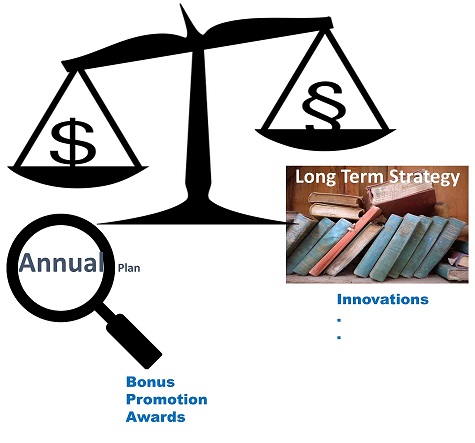Most impactful innovations are those that take a longer gestation time. This clearly points to the importance of the role that Long-term strategic plan should play in driving innovations. This post discusses the issues related to Long-term strategy in companies and hence its effect on innovation. I suggest we try to answer the following questions first:
- How often does your organization make short term plan (Annual plan, Quarterly plan or even Weekly or Daily plan)?
- How often does your organization make Long term (LT) strategy/plan?
- How often is the output of LT strategy/plan referred by managers? Are the past LT plans referred while making the next LT strategy?
- Is the LT plan considered while making the annual plan?
- What inputs are used to make the performance goals of people? How much of this input comes from the Annual plan and how much from the LT strategy/plan?
- In your view is LT planning an academic exercise? Is it done because others do it? Is it done to consolidate all the information for the Leadership team and the Board? Or do you think the Board uses it but not everyone in the organization knows about its usage?
- Do you see a specific innovation plan as part of the Long-term plan? Do innovation projects reflect in the annual plan?
The annual plan has predominantly numbers in it and is translated into a score-card and goals for the teams and individuals. The variable pay, annual raise and promotions are based on achievement of goals.
Most of you would have felt that that Long-term Strategy/Plan is either not made or if made, is not referred after it is printed/circulated. It, no doubt, occupies a key place in the shelf of senior leaders and select managers. The numbers in LT plan are exponential as that is the expectation from the board. The LT-plan is not even used while making Annual-plan, which is more linear and incremental as compared to previous year. Unlike the annual plan, LT plan has no bearing on the team score-card or the goals of individuals. I have never seen any use of LT plan to decide rewards or promotions of people.
Companies do not wish to spend time on developing long-term plans. There are three reasons for this behavior:
- The future is unpredictable: With increasing VUCA, leaders feel that the future is becoming more and more unpredictable and hence there is no point in spending time in developing a plan that will be irrelevant anyway.
- We need to take decision to make a strategy: With so much of uncertainty, the decisions which have a Long-term impact are made or changed frequently. To craft a LT strategy, it is necessary to take a few decisions on issues that have a longer-term impact. Managers do not want to take a position in something that could change and prove their decision wrong in near future.
- Strategy is developed where the action is: The strategy in companies is usually developed BU-wise or function-wise or Product-wise. The information asymmetry that exists between the BU, Functions, Products and the corporate team doesn’t allow people to actively participate in the discussions. Most of these sessions turn out to be negotiations with the corporate team.
The first reason stated above for not engaging on making a LT strategy is misplaced because all companies get surprised with the announcements made by their competitors (including start-ups) on new products and services. We tend to ignore early warning signals from our competitors and especially the start-ups. Once the threat is evident, we express helplessness. This failure, unfortunately, is attributed to increasing VUCA by managers at all levels. Some of these surprises would have taken companies a few years of hard work, which would have got funded only through their LT plan. It is almost impossible for a lone employee to quietly work on these surprises without the sponsorship of the organization.
The mindset of not accepting to change their own past decision emanates from the fact that managers think that are supposed to take right decision and are also measured using this metric. We need to remember that ‘right decision’ in management has a context of time. The board and leaders should accept and communicate that ‘taking position/decision’ and ‘being flexible’ are two equally important attributes that are required to make and refine long-term plans. Therefore, LT strategy should focus on building perspectives about the future, assigning probabilities and developing options for various scenarios.
Due to the issues related to LT strategy, many companies overlook the LT plan (similar to new year resolutions) and focus only on annual and quarterly plans. In fact, a report by FCLT suggests that company Board is the root cause for the pressure that drives management to focus too much on short term sacrificing long-terms focus. Most management decisions are taken to support those actions which deliver the results in the same year and help achieve the annual target. Some management decisions though are taken to support those targets that are necessary to achieve the long term committed targets. for instance, some long-term investment plans (eg putting up a new factory, acquisitions) are made to meet the long-term linear expectations of the investors. One common aspect for all these decisions is that they inherently have less uncertainty about the outcomes. And we know that innovative ideas have higher uncertainty and longer gestation period! Needless to say that innovation would not be fueled enough in both the scenarios: (i) Absence of a LT plan (ii) If the annual plan is dominated by numbers.
References:

